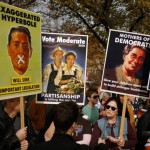Sanity Marchers Vs Tea Partiers: Who Knows More?
 Six months ago, we interviewed tea partiers to discover how informed they were. Saturday, we put attendees of the Stewart-Colbert rally to the same test.
Six months ago, we interviewed tea partiers to discover how informed they were. Saturday, we put attendees of the Stewart-Colbert rally to the same test.
Six months ago, FrumForum interviewed tea party protesters on the Washington Mall to discover: How much did they know about the taxes they were protesting?
The answer turned out to be: not very much. They believed taxes were much higher than they really were, and they were certain that federal taxes had risen under Obama when in fact they had dropped.
We thought it only fair to try the same questions upon the attendees at the Stewart-Colbert rally on the Mall.
Result: While these attendees are swayed by ideology, on balance they were better informed than the tea party protesters in March.
We interviewed 150 people on the Mall on Saturday, enough to come close to a random sample.
The average tea party estimate of the federal tax take of the economy was 40%. The Stewart-Colbert attendees answered 20%. That was a pretty good guess, in line with the postwar historic average. It’s not correct however: since 2008, the federal tax take has collapsed below 15%.
Asked about the federal tax burden upon the typical American, a worker earning $50,000 a year, the Stewart-Colbert attendees likewise came closer to the truth than the tea party protesters.
As Bruce Bartlett noted in commenting on the tea party survey there are a lot of possible “right” answers to the question about tax burden depending on the assumptions you make. The highest possible answer would be about $8700 for a single person with no children and no home mortgage deduction. A married family with children would pay considerably less.
The median estimate by tea party attendees was $10,000 outside the range of correct answers. The estimate by the Stewart-Colbert attendees was $7,500, within the range.
We asked both tea partiers and Stewart-Colbert attendees to estimate how the U.S. ranked in terms of life expectancy. The tea partiers offered an average answer of 11th. The Stewart-Colbert attendees were less positive: they averaged 20. The CIA Factbook puts the actual number even lower, 34th.
There are limits to the knowledge of the Colbert-Stewart attendees: 40% of them could not name their member of Congress.
We also asked some opinion questions. About 80% believed the economy had improved over the past year, but many tempered this response by saying that the economy was improving only slowly.
However, only 37% said their own personal economic situation had improved.
One conclusion to draw from our unscientific survey is that people’s perceptions make for easy alignment with their pre-conceived political convictions. Conservatives at tea party rallies rail against taxes – and so their perceptions overestimate the real tax burden. Liberals are unhappy with the pre-Obamacare healthcare system, and thus believe the quality of American healthcare to be worse than conservatives do.
My previous piece on tea partiers talked about conservatives as scorning traditional media outlets, instead choosing news sources that create an “echo chamber” of self-confirming facts. But liberals may not be immune to this same trend. If America really wants sanity, its citizens will have to do more to align their perceptions to reality.
Add Tim on twitter: www.twitter.com/timkmak